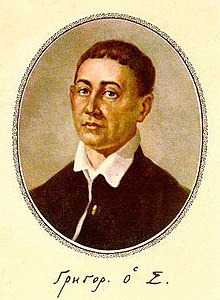ON OCCASION OF THE 300TH ANNIVERSARY: HRYHORII SKOVORODA`S PEDAGOGICAL IDEAS AS A PRECURSOR OF DIFFERENTIATED TEACHING
DOI:
https://doi.org/10.20535/2410-8286.285005Keywords:
H. Skovoroda, differentiated learning, personality-oriented learning, methodological principlesAbstract
On 3rd December 2022, we celebrated the 300th anniversary of the birth of Hryhoriy Skovoroda – one of the greatest Baroque thinkers, poets, educators and writers of the XVIII century. His influence on the development of Ukrainian and worldwide pedagogy is difficult to overestimate, however, today we would like to stress the importance and relevance of his ideas by analysing them through the prism of a modern approach to education – differentiated teaching and learning. H. Skovoroda`s studying at Kyiv Mohyla Academy, where he had a chance to meet famous and prospective philosophers, thinkers, and activists of the time, and his experience of teaching and lecturing at famous Ukrainian educational centers shaped his views on teaching methods. Combined with his philosophic views these ideas prove to be relevant in the modern conditions. The article analyses the main principles of differentiated learning – principles of taking into account the individual characteristics of students, accessibility, systematicity, consistency, autonomy, and consciousness through their connection to Skovoroda`s ideas. The analysis showed that H. Skovoroda formulated some of the fundamental principles of personality-oriented learning, which were precursors for developing ideas of differentiated learning.
Downloads
References
- Baklazhenko, Y. V. (2016). Methodology of Individualized Teaching of Professionally Oriented Written English Language to Future System Analysts. PhD. thesis, Kyiv National Linguistic University.
- Dewey, J. (1991). The School and Society and The Child and the Curriculum. The University of Chicago Press.
- Ehrman, M. E., Lou Leaver, B., & Oxford, R.L. (2003). A Brief Overview of Individual Differences in Second Language Learning. System, 31, 313-30. https://doi.org/10.1016/S0346-251X(03)00045-9
 |
| 
- Grasha, A. F. (2002). Teaching with Style. A Practical Guide to Enhancing Learning by Understanding Teaching & Learning Styles. University of Cincinnati: Alliance Publishers.
- Jung, C. G. (2016). Psychological Types. Martino Fine Books.

- Kolb, D. (1976). The Learning Style Inventory: Technical Manual. Boston, Ma.: McBer.
- Melikova, S. O. (2008). Individualization of professionally oriented teaching of foreign languages to students of non-linguistic specialties in at higher pedagogical institutions. PhD. thesis. abstract, Kryvyi Rih State Pedagogical University.
- Mykhailyshyn, R. Folk Pedagogics as a Source of H. Skovoroda`s Pedagogical Ideas. https://scholar.google.com.ua/citations?user=S20WKRAAAAAJ&hl=uk
- Nikolaieva, S. Yu. (2013). Methodology of teaching the English language and culture: theory and practice. Kyiv: Lenvit.
- Rousseau, J.-J. (1979). Emile, or On Education. Hachette.
- Sherstniuk, V. P., Malys, O.M. (2018). By Blesses Steps. Philosophy of Communication, Pholosophy, Psychology, Social Communication, 11, 90-96.
- Skovoroda, H. (1973). Full collection of works in 2 volumes. Kyiv: Naukova Dumka.
- Tkachenko, L. (2007). Pedagogical Ideas of H. Skovoroda in the Context of Scientific and Pedagogical Thought of the XVIII Century. Psychological and Pedagogical Problems of Modern School, 23, 187-194. http://nbuv.gov.ua/UJRN/Ppps_2007_23_31
- Tomlinson, C.A. (2014). The Differentiated Classroom: Responding to the Needs of All Learners. Alexandria: ASCD.
- Ushynskyi, K. D. (1983). Selected pedagogical works. Kyiv, Radianska Shkola.
- Zorik, V. (2011). The Pedagogics of G.I. Skovoroda. Kharkiv University bulletin, 45, 245-249. http://nbuv.gov.ua/UJRN/VKhITK_2011_980_45_40

Downloads
Published
How to Cite
Issue
Section
License
Copyright (c) 2023 Yuliia Baklazhenko, Zoia Kornieva, Iryna Borbenchuk

This work is licensed under a Creative Commons Attribution 4.0 International License.
Authors who publish with this journal agree to the following terms:- Authors retain copyright and grant the journal right of first publication with the work simultaneously licensed under a Creative Commons Attribution License that allows others to share the work with an acknowledgement of the work's authorship and initial publication in this journal.
- Authors are able to enter into separate, additional contractual arrangements for the non-exclusive distribution of the journal's published version of the work (e.g., post it to an institutional repository or publish it in a book), with an acknowledgement of its initial publication in this journal.
- Authors are permitted and encouraged to post their work online (e.g., in institutional repositories or on their website) prior to and during the submission process, as it can lead to productive exchanges, as well as earlier and greater citation of published work (See The Effect of Open Access).


















